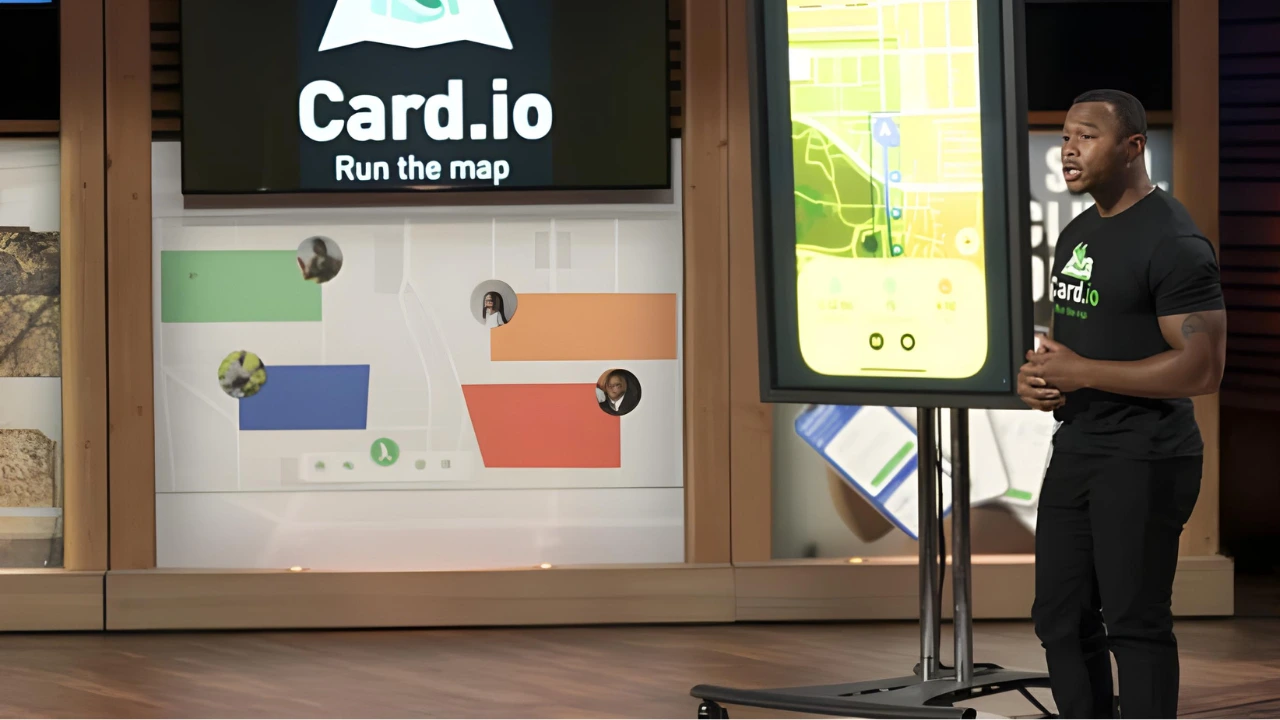Card.io Running App Shark Tank Update | Season 16
Founder Destin George-Bell secured a $150,000 for 15% equity with Rashaun Williams and Daymond John.
Quick Overview of the Card.io Running App Shark Tank Update
- Shark Tank Appearance: Season 16, Episode 1
- Founder: Destin George-Bell from Austin, Texas
- Ask: $150,000 for 5% equity
- Deal: $150,000 for 15% equity with Rashaun Williams and Daymond John
- Achievements: Over 22,000 users in 70+ countries, $470,000 raised including $150,000 from Pokémon Go grants, 34% retention rate after 30 days.
The Card.io Running App, developed by Destin George-Bell, transforms mundane card.io into a competitive and fun experience. This gamified app encourages users to run, walk, or bike while claiming “turf” in their cities, adding a layer of excitement and social interaction.
Designed for fitness enthusiasts who struggle with motivation, the app aims to blend cardio with community engagement. With a unique freemium model and a premium option, Card.io sets itself apart from traditional fitness apps. Let’s find out what happened to the Card.io Running App in the Shark Tank.
Shark Tank Pitch Recap
Destin George-Bell, a 26-year-old University of Kentucky graduate, stepped onto the Shark Tank seeking $150,000 for 5% of Card.io, valuing the company at $3 million. The app had already gained traction, boasting 22,000 users across 70 countries and $470,000 in funding.
Destin highlighted its core features: gamifying cardio through a turf war game, fostering social competition, and offering both free and premium subscriptions. He impressed the sharks with Card.io’s 34% retention rate and partnerships with marathons and wellness companies like Oracle.
While some sharks expressed interest, others like Lori Greiner and Kevin O’Leary opted out, citing either a lack of interest in the market or insufficient data. However, Rashaun Williams and Daymond John saw potential and offered $150,000 for 15% equity. After a brief negotiation and a call to his mom, Destin accepted the deal.
What Happened After Shark Tank
Following its Shark Tank debut, Card.io leveraged its exposure to rapidly expand its user base. Social media buzz was strong, driving the company to introduce an Android waitlist and add features like team chats and “ghost mode,” which allows users to compete anonymously.
The app maintained its focus on growth through partnerships, marathon integrations, and run clubs. Its monthly revenue climbed to approximately $4,000, fueled by premium subscriptions.
Also, don’t miss this update on Shark Tank products from Season 16, Episode 2
Product & Financial Overview
The Card.io app is built around gamified cardio workouts, creating a unique social experience for users. Here’s what makes it stand out:
- Freemium Model: Free access to basic features, with a $25/month subscription for premium features.
- Gamified Competition: Users compete for turf in their city, creating a large-scale, game-like atmosphere.
- Social Engagement: Includes features like team creation, virtual events, and anonymous competition (“ghost mode”).
- Retention Rate: 34% after 30 days, indicating strong user engagement.
- Funding: $470,000 raised to date, including grants from Pokémon Go.
- Current Revenue: Around $4,000/month from premium subscribers.
Future Plans
Card.io aims to enhance user engagement by adding new game modes, more interactive features, and expanded global access. With a focus on growing its community, the app plans to partner with more marathons and wellness events while launching the much-anticipated Android version. Additionally, it is exploring AI-based performance tracking to personalize workouts further and maintain high retention rates.
Closing Remarks
Card.io’s journey from pitch to progress exemplifies the power of combining fitness and technology to keep users motivated. As it continues to evolve, Card.io promises a future of fun, competitive cardio for fitness enthusiasts worldwide. Keep an eye on this app as it aims to make waves in the fitness world!






